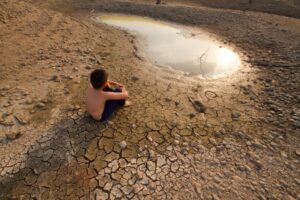Are climate change and suicides linked? A recent study published in the journal PNAS suggests so, drawing a correlation between increasing temperatures and suicides in India.
In the words of Dr. Vikram Patel, an influential Indian psychiatrist and mental health expert with Harvard Medical School, “farming is an inherently risky occupation, with annual incomes often held hostage to the weather, and it’s getting riskier in the era of climate change.”t
The study itself suffers from a flawed methodology. As such, its conclusions are somewhat arbitrary and an oversimplification of the situation.
It does, however, point to a larger issue: that the farming profession in India is becoming more unpredictable and farmers, especially those with existing mental health conditions, are consequently at greater risk of suicide.
A lack of mental health interventions in rural communities seems to be exacerbating the issue. Dr. Patel, speaking to Health Issues India, notes
![By Roger Deckker (http://www.wired.com/2013/12/patelqa/) [CC0], via Wikimedia Commons](/wp-content/uploads/2017/08/Vikrampatel.jpg)
Mental health interventions, in particular targeting depression and alcohol abuse, are likely to greatly reduce the burden of suicide in farming communities, and much of these interventions can be effectively delivered by front-line workers with appropriate training and supervision.”
The study begins with an initial observation — sourced from 47 years of nationally comprehensive panel data — that since 1980, suicides in India have doubled. This information alone is alarming, indicating that despite a growing economy due to India’s industrialisation during these years, mental health issues are not being addressed.
This is backed up by spending figures. Mental health spending currently accounts for just 0.06 percent of India’s health budget. By comparison, Bangladesh spends 0.44 percent of its health budget on mental healthcare.
The study posits climate change as one of the biggest factors in the rising rates of suicide, in particular the increase in temperature. The paper claims that, above a 20°C threshold value, every 1°C increase in temperature is responsible for around 70 suicides. This claim may not address the full story, and seems to be assigning a situation with a host of variables and reasonings to a single factor.
This claim may be simplifying the situation but, as mentioned above, it does have reasoning behind it.
 The increase in suicide rates that were correlated with the temperature increase were not observed outside of the growing season. This would indicate that the increase in temperature is linked with events such as droughts and failing crops. These factors may lead to lack of food availability, or reduced pay for farmers and farm workers, which may lead to an increase in suicide rate in these groups of people.
The increase in suicide rates that were correlated with the temperature increase were not observed outside of the growing season. This would indicate that the increase in temperature is linked with events such as droughts and failing crops. These factors may lead to lack of food availability, or reduced pay for farmers and farm workers, which may lead to an increase in suicide rate in these groups of people.
This claim is further backed by the fact that heightened rainfall — a factor which would increase the amount and quality of crops — was associated with a similar reduction in suicide rates as the rise associated with temperature increase. Using this information the study believes climate change accounts for 59,000 deaths by suicide over the last three decades.
Though the association of around 70 deaths per 1°C seems to be an arbitrarily assigned value upon which this final figure was based, the point of the paper still stands. Many poverty stricken farmers and farm workers in India, due to the financially unstable nature of the farming business, are faced with stress and anxiety. As they are lacking mental health services (a problem especially prominent in rural communities), this can lead to suicide.
India is likely to face more climate related problems in the future. High pollution rates as well as rising temperatures will present further issues with crop shortages. Should the correlation claimed by the paper prove true, suicide rates are likely to continue to increase. This illustrates the need for the expansion of mental health services in India, particularly within rural areas, where rural farming communities are likely to lack any mental health services at all.

